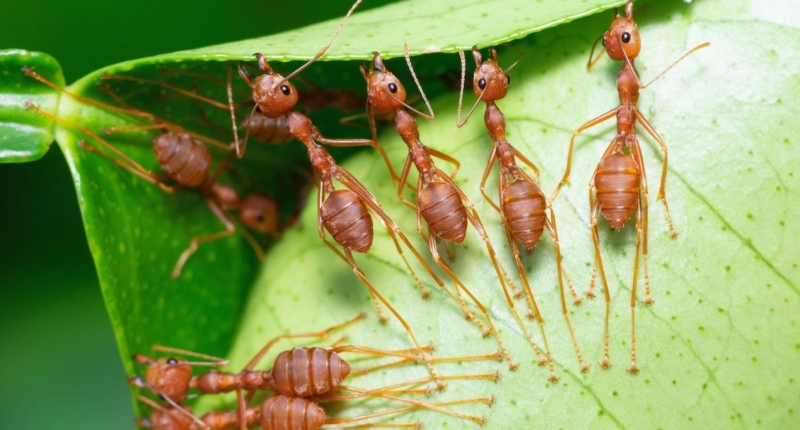Ants rely heavily on their sense of smell to recognize, communicate and cooperate with each other. Each ant has a unique odor signature that varies from individual to individual, and ants from different colonies have slightly different smells, which is vital for colony defense. Researchers have found that ants exercise restraint and opt to accept rather than attack their fellow ant when their sense of smell is compromised. In experiments where ants’ sense of smell was manipulated, they failed to recognize and attack foes and stopped cooperating with their friends. Ants’ sense of smell is essential for accurate communication, and without it, their societal survival is at risk. This phenomenon affects other highly social animals, including humans, where miscommunication or lack of accurate information can have severe consequences. Accurate communication is essential for the survival of ants’ societies, and their sense of smell plays a vital role in this process.
Ants Use Unique Sense of Smell to Recognize Friends Among Trillions of Rivals
Recent research has discovered that smell is the key factor that binds ant societies together and enables them to distinguish enemies from allies. Ants are among the most successful animals on earth, inhabiting nearly every corner of the globe with an estimated population of over ten quadrillion individuals, roughly equivalent to one million ants per person. This success is due, in part, to their incredible sense of smell that allows them to recognize and communicate with each other.
Ants live in complex colonies or nests that house a wide variety of social interactions. Typically, one or more queens are responsible for all reproduction within the colony, while female workers carry out other tasks such as colony defense, foraging for food, and rearing offspring. Ants have even domesticated other insects to help with these tasks and have created agricultural systems that involve growing edible fungal gardens.
For these intricate tasks to be accomplished, the ants require a reliable and secure means of communication among themselves. This is where their unique sense of smell comes into play. Unlike humans, who rely primarily on verbal and visual cues to communicate, ants use their acute sense of smell to recognize each other. Each ant has a unique odor signature carried on their exterior shell or exoskeleton. This scent allows them to distinguish between friend and foe, making it an essential element of their social interaction.
The study of ant communication is important to biologists who study the remarkable sensory abilities of ants. Recent work by researchers showed that ant societies depend on the exchange of reliable information. Any disruption to this process can spell doom for the entire colony.
In summary, ants are capable of recognizing and cooperating with each other thanks to their unique sense of smell. Their societies depend on the exchange of reliable information, and the ability to recognize friends and enemies is essential to their success.
Ants’ Sense of Smell is Vital for Colony Defense and Cooperation
Ants rely heavily on their sense of smell to recognize and communicate with each other. Each ant has a unique odor signature that varies from individual to individual and enables them to distinguish between friend and foe. The queen ant has a different smell from the worker ants, and this difference allows her to receive special treatment within the colony. Importantly, ants from different colonies have slightly different smells, which is vital for colony defense. Ants can trigger aggressive turf wars between colonies when they catch a whiff of intruders.
An odor enters the tiny hairs located along the antennae of ants and other insects, which contain special receptors called chemosensory neurons. These receptors sort and send the chemical information to the ant’s brain. Odors act like chemical “keys” that ants can only smell if they are inserted into the correct set of chemosensory neuron “locks.”
When the correct key binds to the correct neuronal lock, the receptor sends a complex message to the brain. The ant’s brain is able to decode this sensory information to make decisions that ultimately lead to cooperation between nestmates or battles between non-nestmates.
Researchers have used laboratory tools, such as precisely targeted drugs and genetic engineering, to manipulate ants’ sense of smell. They found that when they prevented an odor “key” from opening a chemosensory “lock,” it stopped the chemical information from reaching the brain. The ants became less aggressive towards non-nestmates and exercised restraint instead. Without clear information, ants opted to accept their fellow ants rather than attack them.
In conclusion, ants’ sense of smell is vital for colony defense and cooperation. Chemical information is detected through receptors located along the antennae of ants and other insects. This information is sorted and sent to the ant’s brain, where it is decoded to make decisions that lead to either cooperation or aggression. Researchers have found that when ants’ sense of smell is manipulated, it impacts their group behavior, and they exercise restraint instead of attacking non-nestmates.
Accurate Communication is Essential for Ants’ Societal Survival
Living in a colony with tens of thousands of sisters, ants’ ability to communicate with each other and distinguish between friend and foe is crucial. Researchers believe that social restraint is hard-wired in ants and gives them an evolutionary advantage, preventing mistaken identity or miscommunication that could lead to societal chaos.
In experiments where ants’ sense of smell was compromised, they failed to recognize and attack foes and stopped cooperating with their friends. This led to societies collapsing, and the colony quickly died. Ants’ sense of smell is essential for accurate communication, and without it, their societal survival is at risk.
This phenomenon affects other highly social animals, including humans, where miscommunication or lack of accurate information can have severe consequences. In conclusion, accurate communication is essential for the survival of ants’ societies, and their sense of smell plays a vital role in this process.
Don’t miss interesting posts on Famousbio
